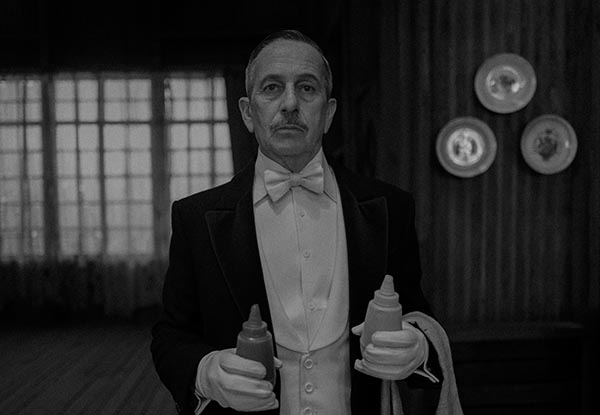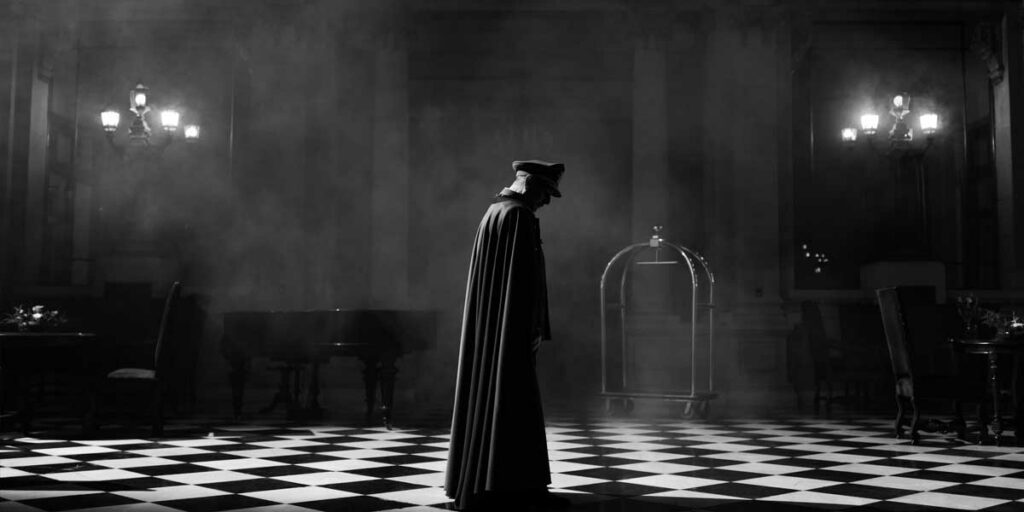Pablo Larraín‘s El Conde is neither as funny nor as original as it thinks it is, but it will still satisfy fans of the director’s trademarks.
Pablo Larraín’s first film after Spencer tells a “farce” that “began centuries ago — in France, of course,” the “farce” in question being that of Augusto Pinochet. El Conde ‘s titular character is the Chilean dictator who overthrew the Allende government in 1973 and appointed himself president of a new military junta for nearly 20 years. During those years, he did anything from tax evasion and corruption to torture, kidnapping, and the violation of human rights — only to be exonerated from standing trial for these charges in 2002, when he was declared “mentally incapable of defending himself in court“. But, while Larraín’s Pinochet (Jaime Vadell) is all of the above, he’s also a lot more than that.
The man we meet in El Conde was born many years prior to the 1974–90 dictatorship, and his story began in 18th century France, where he was living his best life as a young vampire, witnessing beheadings, drinking blood, and brutally murdering anyone who stood in his way. But when we meet him, many fakings of deaths later, our dictator has been alive for 250 years, and is finally ready to die.
“Why keep living in a country that despises me?,” the general asks Fyodor (Alfredo Castro, of The Club), his vampire servant (and his “only and most loyal slave,” according to El Conde ‘s opinionated narrator) as he explains that he has decided to stop drinking blood. And even though the “count” is somewhat volatile when it comes to making decisions about his own life, his death wish alerts everyone around him – from his wife Lucía (Gloria Münchmeyer) to his opportunistic sons and daughters (Antonia Zegers, Paula Luchsinger, Amparo Noguera, Diego Muñoz, Marcial Tagle, and Catalina Guerra), who all try to profit from his impending demise.
Some, like Lucía, want eternal life; others are more interested in Pinochet’s material goods, especially those assets the government wasn’t able to find during the trial. And then there’s a certain someone who’s on an entirely different mission altogether that involves heart smoothies and vampiric flights. Soon, the time comes to hire someone who’ll find proof of the “conde”‘s most hidden funds, and an accountant is hired – only, she’s actually an exorcist nun named Carmencita (Paula Luchsinger) whose real mission is that of ridding Pinochet of the devil, since she believes him to be possessed.

And so, the stage is set, and our tragedy begins, unfolding one piece of the puzzle at a time. But it’s just when you think you’ve got it all figured out that Larraín does his magic, and we suddenly begin to get the film. El Conde ‘s fast-paced ending is its best feature, as it gives us an unexpected twist through which the writer-director and co-writer Guillermo Calderón send their message across: Pinochet is never going to stop sucking blood out of Chilean citizens, as the country is still experiencing an endless cycle of corruption that will only keep renewing itself throughout the years. And so, Larraín gives us a religious parable where nobody gets redemption. By the time the credits roll, its greedy, selfish protagonists are exactly how they were when we first met them, and we are stuck with them, no matter how hard we try to get rid of them.
Cinematographer Ed Lachman brings us a world that comes alive in gorgeous, desaturated black and white that makes everything feel more surreal and dream-like. The symmetrical sequences of Pinochet flying over Chile at night, his uniform resembling a cape that makes him look like a bat — or “a mix of Nosferatu, Batman, and Superman,” like Larraín’s script reads — are hypnotic, and though he does terrible things as a vampire (on top of those we know him to have done as a human), we can’t help but be fascinated by him. The score (Juan Pablo Ávalo and Marisol García) takes us back in time with classical music imbued with magic realism and a hint of darkness. And while we’re, at times, a little too aware of the sound design — particularly of the ever-present noise of wind blowing through the windows of Pinochet’s crumbling house — it’s also used effectively in other ways.
Pablo Larraín fans are bound to enjoy El Conde for its charming premise, effective technical execution, and the director’s trademarks. Unfortunately, the film is also not entirely successful when it comes to pacing, structure, and overall message. Not only is the movie a lot longer than it needed to be — and that length can be perceived at all times — but some creative choices are a little baffling, and its overall message doesn’t really go beyond its initial premise. Knowing the kind of depth Larraín has gotten us used to, El Conde feels like a missed opportunity, as the same concepts are pretty much repeated throughout the movie, in a way that’s more sleep-inducing than thought-provoking, and with no real purpose or direction.
El Conde is a clever film with a great premise, excellent technical execution, and fantastic performances from the entire cast, but it’s sadly neither as funny nor as original as it thinks it is. But you’ll still enjoy it if you’re a fan of the director’s style, and if you manage to sit through its longer first half, you’ll be rewarded with a great twist at the end.
El Conde premiered at the 2023 Venice Film Festival on August 31, 2023. The film will be released in select US theaters and UK cinemas on September 8, and globally on Netflix on September 15, 2023.

